Concern is mounting in Burnaby where a $4 billion pipeline expansion is raising serious questions about the viability of the Lower Mainland’s only surviving oil refinery.
Chevron’s (NYSE:CVX) Burrard Inlet refinery has been in operation since 1935, employing hundreds of workers and paying one of the highest property tax bills in Burnaby.
Kennedy Stewart, NDP MP for Burnaby-Douglas, is concerned that Kinder Morgan’s (NYSE:KMI) $4.1 billion plan to expand the Trans Mountain pipeline could destroy the business plan for Chevron’s refinery.
The expansion would increase Canadian crude oil shipments to the West Coast, where local exporters such as Royal Dutch Shell(NYSE:RDS.A), Suncor (TSX:SU), Imperial Oil (TSX:IMO) and others would buy the product and sell it to foreign markets.
Stewart’s concern is that it’s more profitable to sell the crude oil to foreign buyers than refine it in B.C., which would kill the viability of Chevron’s refinery.
“That is our only major oil refinery in British Columbia … and if it closes then it means we will be in the really absurd position of being some sort of oil superpower that has to import its product,” said Stewart. “That’s a huge concern for me because it will mean an increase in gas prices.”
Decades ago, Burrard Inlet was home to four oil refineries (oil has been shipped via tanker out of the inlet for close to a century), but energy consultant John Hunter saidthose plants closed as it became cheaper to build larger refineries closer to the oilsands.
In fact, the number of oil refineries across Canada is on the decline.
Earlier this month, Imperial Oil put its Dartmouth refinery up for sale amid lower demand and competition from offshore rivals.
In B.C., Shell, Suncor and Imperial Oil now operate only petroleum product distribution terminals along Burrard Inlet, which employ fewer workers than refineries.
The union branch representing refinery workers at Chevron’s Burnaby plant have already voiced concern about cutbacks at the refinery.
But Ray Lord, Chevron Burnaby’s spokesman, said the company plans to continue operating the refinery, which supplies a third of the Lower Mainland’s gasoline needs.
“Some of the comments we’ve heard … are premature and perhaps speculative,” said Lord. “The refinery is securing crude, has for some time and our intent is to continue doing that.”
But Lord said Chevron has no plans to expand the refinery, which is facing more competition than ever for the crude it needs to operate. He said there’s so much demand for Trans Mountain’s current supply of petroleum products that it’s being portioned among all buyers and affecting the refinery’s ability to get access to crude.
Chevron has been forced to start shipping crude to the refinery via truck and is planning to start importing crude via rail later this year.
As much as 20% of the refinery’s crude oil needs could be shipped via truck or train by 2013.
Stewart said those shipping methods are expensive, and he maintains that the reduction in refineries across the country has become a national problem that could soon affect Burnaby.
Hunter, meantime, doesn’t believe the Trans Mountain expansion will have a significant effect on Chevron’s refinery.
If anything, he said, it would increase the supply and, to an extent, the cost of crude to the facility. •




